This is Part 2 of the Chronicle of Irving Azoff. Delve deeper into his intriguing career with other series that include his pivotal roles heading MCA Records and orchestrating the Live Nation-Ticketmaster merger.
From the outset of Irving Azoff’s career, he demonstrated a remarkable ability to forge connections to power players in the music industry. These early relationships included the leading Chicago disc jockey Art Roberts and the “Godfather of the Music Industry” Morris Levy. The genesis of these connections remains a subject for investigation, but it is clear that Azoff was a nonstop hustler.
Azoff graduated from high school in Danville, IL in 1966 and moved thirty miles west to attend the University of Illinois Urbana-Champaign. Soon after, he began working at Blytham Limited, a booking agency that dominated the rock music touring circuit south of Chicago and across the Midwest.
The Perennial Problem in the Music Industry
The Blytham agency is often remembered as a local monopoly that used strong-arm tactics to corner the market. This foreshadowed Azoff’s later fusion of Ticketmaster and Live Nation in 2010. As this series progresses, we will continue to explore how Azoff was able to write the rules of the musical-industrial complex.
Monopoly and Payola
In my assessment, there are two main pillars of success in the music industry: monopoly and familiarity.
There are two types of monopoly:
vertical integration: controlling the supply chain (e.g. record labels, venues, talent management)
horizontal integration: controlling the majority of the market share.
Familiarity is scientifically proven to increase a song’s likelihood of becoming a hit. This happens when a song resembles earlier hits or is heard repeatedly by listeners.1 Payola, also known as ‘pay to play', is a surefire method to manufacture a hit. The more money allocated to payola, the greater chances the song will get stuck in someone’s head. Therefore, a music monopoly facilitates establishing a song’s familiarity and ensuring its success but also significantly boosts record labels' revenues, enabling them to manufacture more hits and consolidate their market dominance.
Ever notice in the game monopoly we know exactly who will win long before the game is over?
Dick Clark, known as “America’s Oldest Teenager”, hosted American Bandstand for decades, a live tv show where teenagers danced to the the latest hit songs. He capitalized fully on his cultural monopoly by managing bands, owning song publishing rights, and manufacturing records, placing him in a league of his own. In this interview clip, Clark describes his vertically integrated business model, emphasizing he did not engage in payola because he did not receive direct payments to play records on American Bandstand.2
Clark’s monopoly on teenage ears and eyeballs enabled him to make a killing in his vertically integrated business. This example vividly illustrates how monopolies have been endemic to the music industry.
The foundation of the rock and roll touring circuit was laid in the 1960s through regional monopolies, many of which were rooted in longstanding mafia territories. This environment facilitated their rapid development. Within decades, Live Nation gobbled up a majority of these regional monopolies. The 2010 merger of Live Nation and Ticketmaster cemented their monopoly over the entire live event industry in the United States. Such concentrated power often suppresses critical voices within the sports and entertainment industry, while soaking up every penny from devoted fan bases.
Champaign Wishes with Rock & Roll Dreams
Champaign Becomes a Music Mecca
The Champaign music scene boomed in the mid-1960s, drawing comparisons to perennial music hubs like Austin, TX and Nashville, TN. In 1966, Champaign saw the opening of its first rock club, Chances R, followed quickly by other venues. The "Big Three" — Chances R, the Red Lion Inn, and the Brown Jug — became central to the local zeitgeist, hosting future Rock and Roll Hall of Famers such as REO Speedwagon, alongside national acts like The Ramones, Little Richard, and Chaka Khan.34
Interestingly, many contemporary music fans may not realize that many rock shows often took place in unconventional venues like union halls or churches. This era saw a flood of capital investment into the rock scene, fostering rapid expansion. These conditions provided fertile ground for young upstarts like Irving Azoff to thrive.
The Boom of Regional Music Scenes
Across the country, similar regional music scenes experienced their own booms. Emerging businesses quickly dominated these scenes, as seen with Belkin Productions in Cleveland, Cellar Door Productions in D.C., and Electric Factory Concerts in Philadelphia. These enterprises eventually caught the attention of Live Nation, which acquired substantial stakes in many of them.
Jack Boyle, a big time promoter associated with Cellar Door Productions, exemplified this trend in Washington, D.C.. Boyle went as far as purchasing instruments for new bands, with the condition that they play shows to “work off” their debts. By 1998, Boyle had sold Cellar Door Productions to SFX Entertainment, the company from which Live Nation emerged from in 2005.56
[Boyle] agreed yesterday to sell his company, the nation's last major independent concert promoter, to SFX Entertainment, an acquisition-driven giant that has bought up all the other big promoters to create a "nationwide venue footprint." - Washington Post
Live Nation: A Federation of Regional Monopolies
In the 2000s, SFX/Live Nation expanded rapidly, acquiring key players in the industry. Belkin Production was purchased in 2001, with Mike Belkin and his son assuming executive roles at Live Nation.7 Meanwhile, in Philadelphia, Live Nation acquired the trademark for Electric Factory, both the name of the promotion company and a historic venue, and prevented AEG, its primary competitor, from using the name for the venue.8
Live Nation’s acquisitions span from stadiums to smaller venues. Presently, the company controls 78% of the highest grossing arenas in the United States.9
These 68 US-based arenas generated a total of $2,911,651,970.00 in revenue. And Ticketmaster-serviced arenas contributing an overwhelming 83% of the gross revenue, reaching $2,429,105,432.00.10
Prior to Live Nation-Ticketmaster merger, this federation of regional monopolies was akin to the plaza system in Mexico’s drug trade. It remains unclear if the live music industry has ever been a genuinely competitive marketplace.
On the brink of the Live Nation and Ticketmaster merger, Azoff discussed his career with PBS, highlighting the established territories in the rock music economy of the 1960s. In this clip, Azoff suggested that the merger was justified due to the industry's historical consolidation around regional territories.
Frank Barsalona is often credited with establishing this rock n’ roll network. As the figurehead of the booking agency Premier Talent, he set the stage for how everyone got paid on the business side of live concerts, often at the expense of musicians.
“The tours [Barsalona] scheduled in that network, which proved hugely successful, provided his clients with freelance income (10 percent of which was his); functioned as a farm system for artists in need of seasoning; and established the basic landscape of the rock concert circuit as it now exists in the United States.” - New York Times, November 28, 201211
Champaign’s integration into this network was unique due to its smaller size and lesser-known status as a music hub nationally. However, it was ultimately Blytham who controlled a significant geographic territory across five Midwestern states, likely allocated by the Chicago Outfit.
The Mythology of Azoff
An MCA Legacy: The Path from Chicago to Hollywood
Uncovering Azoff’s early years has proven to be a challenging and time-consuming endeavor. His story is intricately woven into a bygone era, alongside forgotten power players. Outside of the music industry, Irving is not yet a household name. He is a direct heir to those that built Hollywood into a global dynamo, many of whom came out of Chicago.
Jules Stein founded the Music Corporation of America (MCA) in Prohibition-era Chicago in 1924. By 1983, Azoff would take the helm of MCA Records. During the 1960s, MCA wielded notorious power, in the entertainment industry and government, earning the moniker ‘The Octopus’ due to its extensive influence.12 Stein had relocated MCA headquarters to Hollywood long before Azoff was booking bands in high school. However, MCA’s tentacle to Chicago persisted over decades, a subject to be explored at a later time.
Irving Azoff's Early Influence and “Partnership” with Peter Pelafos
In discussions of Irving Azoff’s origins in Champaign, media often highlights his business relationship with Peter “Tyke” Pelafos, President of Restaurant Concepts Incorporated. Pelafos established the first Red Lion Inn in the late 1960s in Champaign, later expanding to Bloomington (1976) and Dekalb (1980), which was after Azoff relocated to California in the early 1970s.
However, research indicates Pelafos wasn’t Azoff’s right hand man. According to a 2006 article, Azoff’s early role involved booking Chicago bands at the Red Lion Inn,13 despite the fact he managed bookings across various venues in the Midwest. The full narrative of Azoff’s early career continues to unfold, revealing a clearer picture over time.
In a 1978 interview with Rolling Stone magazine, Cameron Crowe depicted Azoff’s rise in the music industry:14
By sixteen, [Azoff] was jousting with local unions over other bands. “What can I do?” he asks. “I couldn’t play an instrument.”
After high school, a club owner/friend named Peter Pelafos who ran a small chain of college nightclubs around the Midwest, let Irving try booking his acts. That was all Azoff needed. He was soon, to the amazement of the nearby Chicago club owners, running the affairs of eighty-six artists (like the Buckinghams and the Cyan’ Shaymes) and promoting them across five states. Suddenly, a group could make or break them whether Azoff put them on his circular.
Azoff left Champaign around 1971, well before Pelafos had a chain of Red Lion Inns. Azoff’s exponential rise to power is hard to believe, yet it mirrors a similar trajectory of musical entrepreneurs in other regional territories. Upon his induction into the Rock and Roll Hall of Fame in 2020 a profile in Pollstar noted:15
Just over 50 years ago, however, Azoff was dropping out of the University of Illinois Champaign-Urbana and already booking acts like REO Speedwagon and Dan Fogelberg in addition to working with a chain of Midwest college nightclubs his friend Peter Pelafos owned and where he helped promote some 90 bands (including The Buckinghams and The Cryan’ Shaymes) across five states.
Note: Azoff’s Oak View Group acquired Pollstar in 2017, which is a publication that focuses on the touring industry.16
In tracing Irving Azoff's early career, his partnership with Peter Pelafos is highlighted as pivotal. However, Azoff's narrative conveniently omits his most significant business partner, Bob Nutt. This selective storytelling underscores Azoff's skill in crafting his origin story in the industry, obscuring crucial elements that offer deeper insights into his formative years.
Bob Nutt, Azoff’s Nearly Forgotten Partner
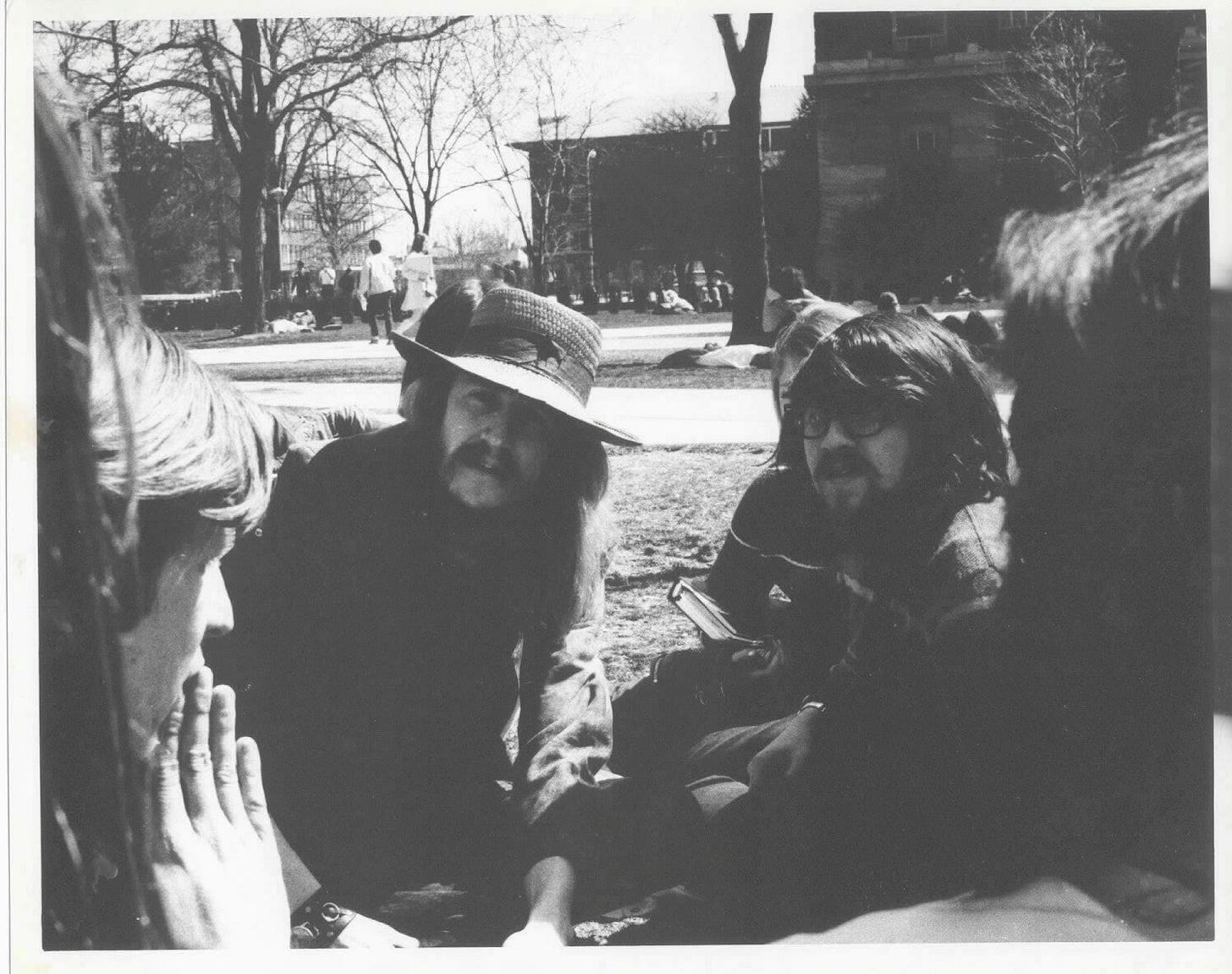
Bob Nutt was Irving Azoff’s first big time partner in the music industry.17 Nutt, a few years older than Azoff, was already a well-established figure in the local scene when he brought Azoff under his wing, initially as his fraternity brother, and later as a partner in Blytham. Together they would dominate the Midwest for a time.
While Azoff ascended to become a Hollywood powerbroker, Nutt remained rooted in Champaign, where his impact on the local music scene was remembered by many musicians of that era:18
“Bob Nutt formed Blytham Ltd., and Irving [Azoff] was his second lieutenant. Bob Nutt created the rock ’n’ roll scene [on campus].” - Geoff Poor of the group Feather Train
“Bob was almost – not mystical, but he had that kind of aura. With his long hair and wild clothes, Nutt was the guru, while Azoff was the workaholic. Their super-agency was one of three converging influences that made Champaign-Urbana stand out among the campus music scene.” - Larry Fredrickson of the group Ginger
Nutt: From Student Government to Rock n’ Roll
Before founding Blytham, Bob Nutt was involved in the University of Illinois Urbana-Champaign’s student senate and the National Student Association, as noted in occasional mentions in the UIUC’s student newspaper, the Daily Illini.19 Interestingly, the National Student Association was later revealed in 1967 to have received significant funding from the CIA, highlighting the complex relationships of the era.20
During the 1960s, alliances between various groups and federal agencies were not uncommon. The CIA plotted with members of the Chicago Outfit to assassinate the Cuban leader Fidel Castro, while the Outfit was heavily involved in the music industry. Meanwhile on the home front, the FBI was running counterintelligence operations on college campuses, including at UIUC.21
The 1960s was rife with profound ideological conflicts, where the counterculture clashed with the national security apparatus. This friction bred mistrust and suspicion within the counterculture, often questioning which countercultural figures were controlled opposition on behalf of the state. Since that time, these questions have persisted regarding the involvement of countercultural figures with federal authorities. For instance, Jim Morrison of the Doors later faced accusations of being controlled opposition due to his father’s role as a Commander in the Navy during the Gulf of Tonkin incident. This incident escalated America’s involvement in the Vietnam War following the assassination of President Kennedy.22
Investigations into connections between countercultural figures and intelligence agencies have been extensive, Allegations include Charles Manson’s plausible involvement with the CIA’s MK Ultra mind control program.23 Tom O’Neill’s recent book Chaos: Charles Manson, the CIA, and the Secret History of the Sixties delves into these complex intersections after two decades of research. Manson’s ability to evade punishment for a host of serious crimes before the Manson Family murders raises questions about the extent of his government connections, despite much evidence being destroyed or classified.
In real life, what criteria must be met to receive a “Get Out of Jail Free Card” from the federal government?
Blytham Limited Begins
The rock and roll scene in Champaign appeared to be a lucrative business opportunity for the young men of Blytham to capitalize on commodified rebellion. According to Illinois Secretary of State records, Blytham Ltd. was officially incorporated on February 10, 1967.24 Initially, Nutt was the ringleader of the Champaign music scene, breathing life into Blytham. Irving Azoff soon joined Nutt’s business partner, and together they swiftly conquered the Midwest.
The Metro St. Louis Live Music Society archives hold a collection of Blytham era documents, including Azoff’s old business card.25
The first rock concert likely produced by Blytham was a battle of the bands around 1966, held at First Baptist Church.26
“I was involved in the prehistory of most of this stuff, singing with the Seeds of Doubt, 1965-68. The Seeds were, I believe, Bob Nutt's second band, after the Finchley Boys. The Battle of the Bands advertised on the accompanying poster (must have been 1966) was kind of Blytham's coming out party -- and took the teen band scene (as opposed to the campus scene) to a new level. A great night. Packed house, the bands going back and forth trying to top each other. No official winner, but we're pretty sure we won.” - Guy Maynard of the Seeds of Doubt
The Finchley Boys and Seeds of Doubt members passionately recount this magical era of the Champaign music scene in recent interviews available on YouTube.
In Champaign, “Irv” represented artists who would later achieve global fame, such as Michael Day, Michael McDonald, Dan Fogelberg and REO Speedwagon.27 John Baruck, now an executive at the Azoff Company, launched his career at Blytham, with REO Speedwagon becoming his flagship band.28 Many other influential figures from this era would rise to prominence in the entertainment business.
The earliest Blytham advertisement I located in the Daily Illini was published February 8, 1967.29 Interestingly, the same issue featured a "help wanted" ad for the NSA (National Security Agency), suggesting the eclectic mix of interests during that era. With the rapid investment in the rock and roll scene, one might wonder if the live music industry itself served as a form of controlled opposition, promoting the hedonism of "sex, drugs, and rock n' roll" over more sober activism aimed at addressing societal inequalities.
Blytham’s Midwest Monopoly
Blytham rose to power swiftly, and within two years of its founding, it faced accusations of monopolizing the local music scene. An article in The Daily Illini on March 16, 1968, vividly describes the negative impact of Blytham’s sominance:30
Once I knew where to look it was not difficult to locate criticisms of how Blytham ran their business empire. Blytham’s power grew so fast that it is only natural to ask how and why? By September 17, 1968, Blytham had an advertisement in The Daily Illini with over 45 bands listed.31
The radio show Downstate Sounds, which “explores the musical past of Illinois outside of Chicagoland from the 1930s through the 1980s”, dedicated episode #47 to discussing Blytham’s near monopoly over the entire region.32 Listening to this episode was a charming nostalgia trip, offering a glimpse into the unpolished and eager rock n’ roll of that era—a welcome reprieve from the overproduced sounds of today.
It’s evident both Nutt and Azoff held the keys to monopolizing the Champaign scene. Steven Hagar’s blog recounts some of the strong-arm tactics Nutt employed to solidify Blytham’s monopoly:33
Nutt would be yelling to someone on the phone, threatening to never let some venue book the Finchley’s again unless they took all of Nutt’s other bands, like the Seeds of Doubt, or the Knight Riders (the band I briefly played bass in), and they also had to promise not to book any band not affiliated with Blytham—since they had cleverly signed every competent high school and college band around. Blytham was establishing a virtual monopoly on live rock music in the area….
Guy Maynard of the Seeds of Doubt was blossoming into a real revolutionary and had a big confrontation with Azof [sic] at the House of Chin… [he told Azoff] that the money from the rock entertainment business belonged to the people, not the rock stars and their managers. Irv really exploded when he heard that line.
This second quote from Hagar recalls Maynard (who was quoted earlier in this article) criticizing Azoff’s business practices to his face. While Maynard appears to approach this from a "revolutionary" perspective, it suggests Azoff may have a casual disregard for the common people.
Decades later, Azoff’s inordinate power in the industry hasn’t tempered his approach. In a 2009 interview with PBS, Azoff discusses his perspectives on conflicts of interest when one company controls many aspects of an artist’s career, including management, promotion and ticketing services. This raises the question of whether the music industry was intentionally structured to exert almost absolute control over artists, possibly as a form of controlled opposition due to their immense influence.
A Blytham Case Study: The One-Eyed Jacks
The One-Eyed Jacks emerged as one of the Midwest’s most popular live bands under the management of Blytham. Bob Nutt, impressed by their performances, took on the role of their manager, alongside Irving Azoff. Band members Barry Fasman and Budd Carr credit Nutt and Azoff for their pivotal role in the band's success:34
According to Fasman, "our managers/booking agents, Nutt and Azoff, were the key for us. They knew that courting disc jockeys would be helpful so that we could get airplay for our records. Hence, we would pay disc jockeys to MC our shows."
By way of this courtship process came one of the band’s biggest supporters: WLS radio of Chicago's popular and influential DJ, Art Roberts. - Budd Carr
This approach circumvented traditional payola schemes, where payments were made directly to DJs for radio airplay. Their strategy proved successful, particularly with Art Roberts, a prominent DJ at Chicago's WLS radio, who became a staunch supporter of the band.
Art Roberts' influence was such that he even snagged an interview with John Lennon in 1964. The close relationship between Blytham and Roberts suggests broader connections within Chicago's music industry.
This connection is further evidenced by the One-Eyed Jacks' record deals, including their initial recordings under Chess Records, a legendary blues music hub in Chicago.35 Coincidently, Chess Records' catalog was acquired by MCA Records in 1986, during Azoff's tenure as its leader.36
Later, the One-Eyed Jacks signed to Morris Levy’s Roulette Records.
Through the concerted efforts of Azoff, Nutt and Roberts, the group was signed to the legendary New York based label, Roulette, run by Morris Levy. The first Roulette release was "California's Callin'" b/w "Together We're In Love" ('69)."37
This connection to Levy is notable, as Azoff later oversaw MCA Records when Levy was sentenced to a decade in prison and fined $200,000 for extortion related to a deal involving MCA Records.38
Morris Levy--longtime president of New York-based Roulette Records and one of the most colorful and influential figures in the U.S. record industry--was sentenced to 10 years in prison Friday and fined $200,000 for conspiring to extort a customer in the 1984 purchase of more than 4 million so-called cutouts, or discontinued recordings, from MCA Records.
- Los Angeles Times, October 29, 1988
Cornering the Hippie Market
The core of rock 'n' roll is often mythologized as quintessentially anti-establishment, rooted in leftist ideals. However, Irving Azoff's career challenges this perception. From the outset, Azoff faced accusations of exploiting artists and consolidating power across the music industry.
Beyond music, Azoff curiously had the investment capital to launch other business ventures. One notable venture was No Hassle, a shop he owned that sold bell-bottoms and hippie paraphernalia.39 An advertisement for No Hassle from the UIUC Archives reflects its marketing appeal.40
Boycott
No Hassle encountered a boycott in 1970, as recounted by a protester in a recent interview during a walking tour of Champaign's Anti-Vietnam War movement. According to the protester, No Hassle was criticized for "exploiting youth culture through 'hip capitalism.'"4142
Rock in Peace Bob Nutt
Details about Irving Azoff’s ascent in the 1960s remain vague, with his business partnership with Nutt often overlooked. Nonetheless, the Champaign scene is nostalgically remembered as a magical time by those who were part of it. The split between Nutt and Azoff will be explored further in the next part of this series.
Locals often credit Nutt as the scene's founder, contrasting with Azoff's somewhat mysterious usurpation of Nutt’s influence.
HollywoodHangover.com, a website chronicling the rock scene from Champaign to Los Angeles during the 60s and 70s, offers insights into the Azoff/Nutt divide:43
“Bob Nutt was involved with REO Speedwagon early on, not later. I was involved with the hiring of bands to perform at the Tigers Den and Nutt was the man (we paid REO $125 a night). Then Irv Azoff came along and they became partners. To make a long story short, the way i heard it from a member of The Seeds of Doubt....Irv and Bob went to LA to promote REO Speedwagon and make it big. They were 50/50 partners and then something happened. I was given details about what happened but i hate to pass along rumors that i cannot verify.”
It's possible that the anonymous source for the Nutt/Azoff split was Guy Maynard, a member of The Seeds of Doubt who appeared earlier in this article as the revolutionary who confronted Azoff at a house party.
This quote also alludes to the split and includes an anecdote about Azoff shaping bands:
Irving saw [our band] and decided he wanted to take ME into the studio and possibly build a band around me. Being a numb-nut from Keokuk, Iowa, I quit BIG HUGE and took off to put together a band with BACKSTREET MAJORITY guys and some others, and recorded a couple of songs for Irving, just as he was selling REO to Epic and dropping Champaign like a hot potato. Seems like Bob Nutt never recovered from all of this.” - Craig Moore, bassist & vocalist in many bands
Following Azoff's move to California, Nutt’s star faded quickly. By the early 1970s, Doug Bauer took over Blytham. Nutt rarely appeared in news articles after his departure from Blytham.
Nutt passed away in 2018 in a vacant house. Reports described him as semi-homeless, confused, and haggard.44 The following year, a tribute concert in his honor brought scenesters back to Champaign from across the country.45 Proceeds from the concert supported a charity for the homeless.
Do you think Irving Azoff attended and bought a ticket?
As the echoes of Champaign's vibrant music scene faded, so did the partnership of Bob Nutt and Irving Azoff. Azoff's departure for California marked the beginning of his ascension to mogul status, leaving Nutt behind. While Nutt's legacy in local music circles endures, Azoff's journey would see him wield unparalleled influence in the music industry, a path often shadowed by questions of unbridled ambition and the individuals who played pivotal roles in Azoff's ascent.
References
Hit Makers is a terrific look at what makes a hit, from the Mona Lisa to Donald Trump. Vox. February 16, 2017.
Payola - Rock ‘n’ Roll on Trial. American Scandal podcast.
The School of Rock. University of Illinois Alumni Association. November 17, 2012.
These future stars first saw the Red Lion Inn. The Pantagraph. July 27, 2006 p. 40.
Cellar Door Joins the Band. Washington Post. 1998.
Jack Boyle, concert promoter who founded a music empire, dies at 83. Washington Post. December 18, 2017.
Legendary Concert Promoter Mike Belkin on His Life Around Music’s Biggest Names and Making Cleveland Rock. Scene. September 20, 2017.
Bowery Presents Acquires Philly’s Electric Factory. Brooklyn Vegan. September 12, 2018.
Ticketmaster has a total stranglehold on the live event industry. Here's how some states are trying to break that. Business Insider. July 10, 2023.
The depth of Live Nation’s dominance: A data analysis of the corporate capture behind top concert venues worldwide. American Economic Liberties Project. June 2023.
Frank Barsalona, Pioneering Rock Agent, Dies at 74. New York Times. November 28, 2012.
see footnote 4
They call him Big Shorty. Rolling Stone. June 15, 1978.
Rob Light & Larry Solters on Irving Azoff’s R&R Hall of Fame Ahmet Ertegun Award. Pollstar. November 11, 2020.
Oak View Group Acquires Pollstar. Pollstar. July 13, 2017.
Irving Azoff was a punk when he attended U of I, too. Smile Politely. March 1, 2009.
The School of Rock. University of Illinois Alumni Association. September 17, 2012.
Veteran delegate to represent UI at NSA meeting. Daily Illini. November 15, 1962.
Ramparts Says C.I.A. Received Student Report. New York Times. February 16, 1967.
COINTELPRO New Left Springfield. FBI Records: The Vault.
Jim Morrison’s dad had a hand in starting the Vietnam War. Business Insider. March 14, 2016.
Chaos: Charles Manson, the CIA, and the Secret History of the Sixties. Tom O’Neill. 2019.
Business records search. Illinois Secretary of State.
Irving Azoff/Bob Nutt (RIP)/Blytham Ltd. The Metro St. Louis Live Music Historical Society.
Champaign Part 2. The Great Hollywood Hangover. Nancy Deedrick.
New Faces to Watch. Cash Box. May 23, 1981.
John Baruck Reaches the Top after 11 years guiding REO Speedwagon. Dan Nooger. Cash Box. May 9, 1981
Daily Illini. February 8, 1967. (p. 2 & p.13).
Campus Music Suffers…. Blytham Monopolizes Bands. Daily Illini. March 16, 1968.
Blytham advertisement. Daily Illini. September 17, 1968. (p. 16).
Show #47: Blytham Ltd & Beyond! The Champaign-Urbana Music Scene 1966-1971. Downstate Sounds. November 19, 2020.
Tag: Bob Nutt. The Tin Whistle: Everything You Know is Twisted. Steven Hagar. February 16, 2012.
The One Eyed Jacks. McLane & Wong: Entertainment Law. Ben McLane, Esq.
Spinning Blues Into Gold: The Chess Brothers and the Legendary Chess Records. Nadine Cohodas. 2001.
Machers and Rockers: Chess Records and the Business of Rock & Roll. Rich Cohen. 2004.
The One Eyed Jacks. McLane & Wong: Entertainment Law. Ben McLane, Esq.
Morris Levy Gets 10-Year Sentence: Roulette Records Chief Fined $200,000 in Extortion Case. Los Angeles Times. October 29, 1988.
University of Illinois, 150 years and beyond: Irving Azoff, The News-Gazette.
No Hassle poster circa 1970. University of Illinois Archives.
Boycott group, stores meet; Follett official to negotiate. Daily Illini. April 11, 1970.
Radical Illini: Walking Tour of Anti-Vietnam Protest Sites on UIUC Campus in the 1960s. Guy Fritz’s Youtube channel. 2020.
...BACK HOME IN ILLINOIS IN THE LATE SIXTIES-EARLY SEVENTIES.... The Great Hollywood Hangover.
Jim Dey:’I was comforted by the fact that Bob was so involved in the church. The News Gazette. November 18, 2018.
Bob Nutt /Blytham Ltd. Tribute Concert. Facebook event page. September 28, 2019.



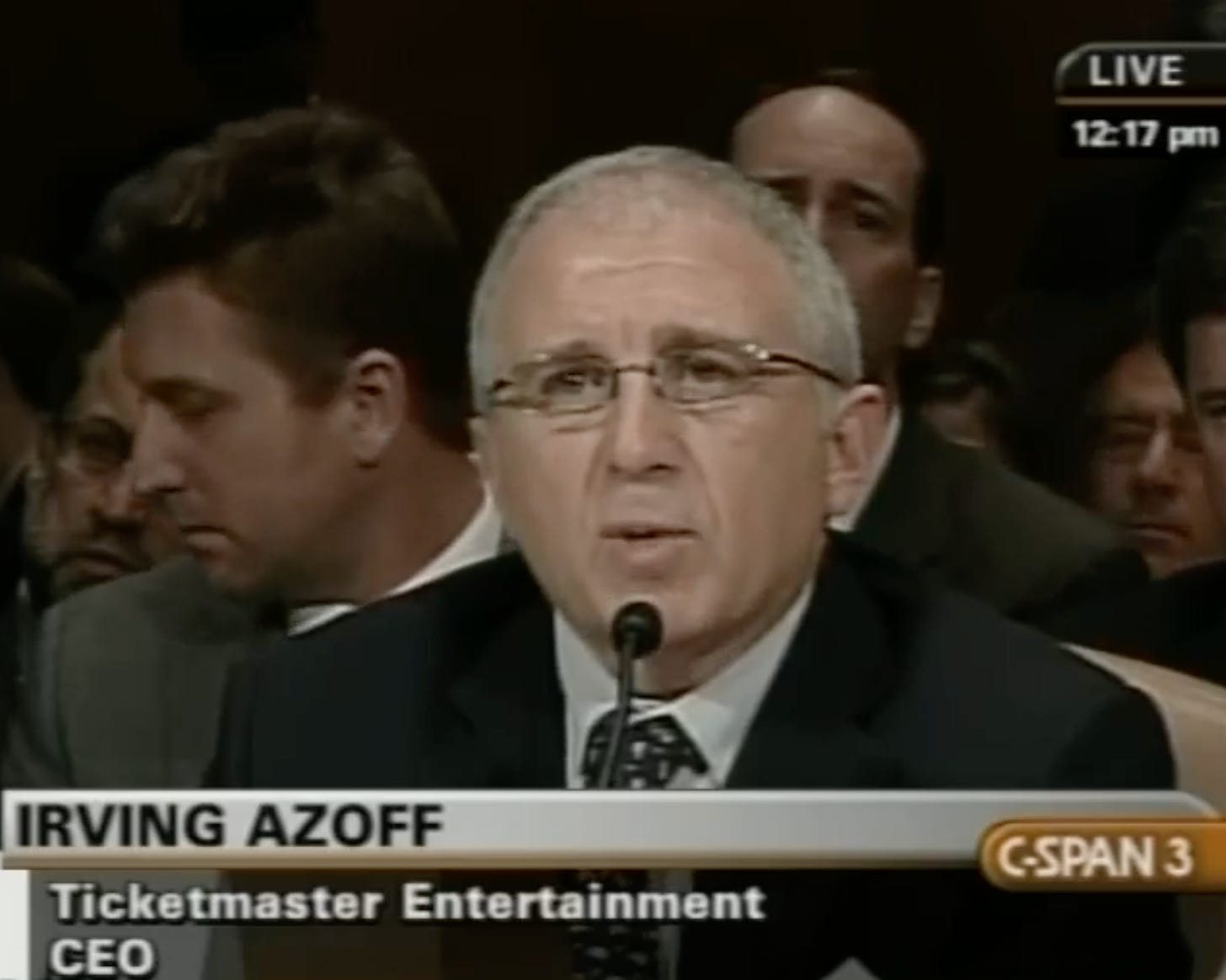
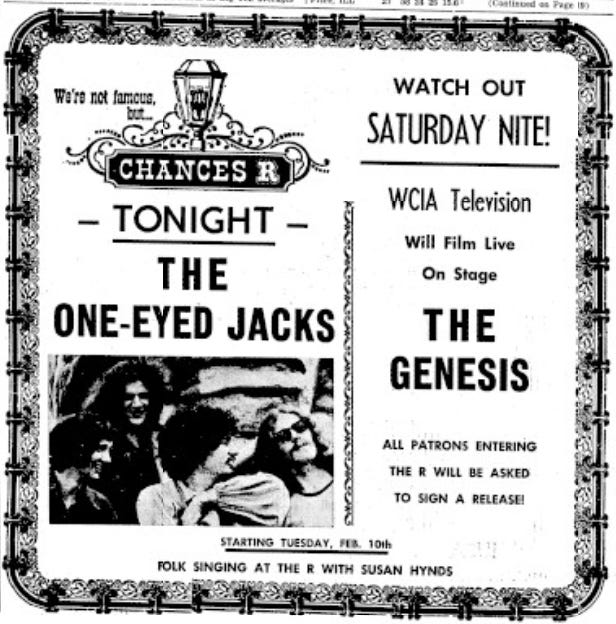
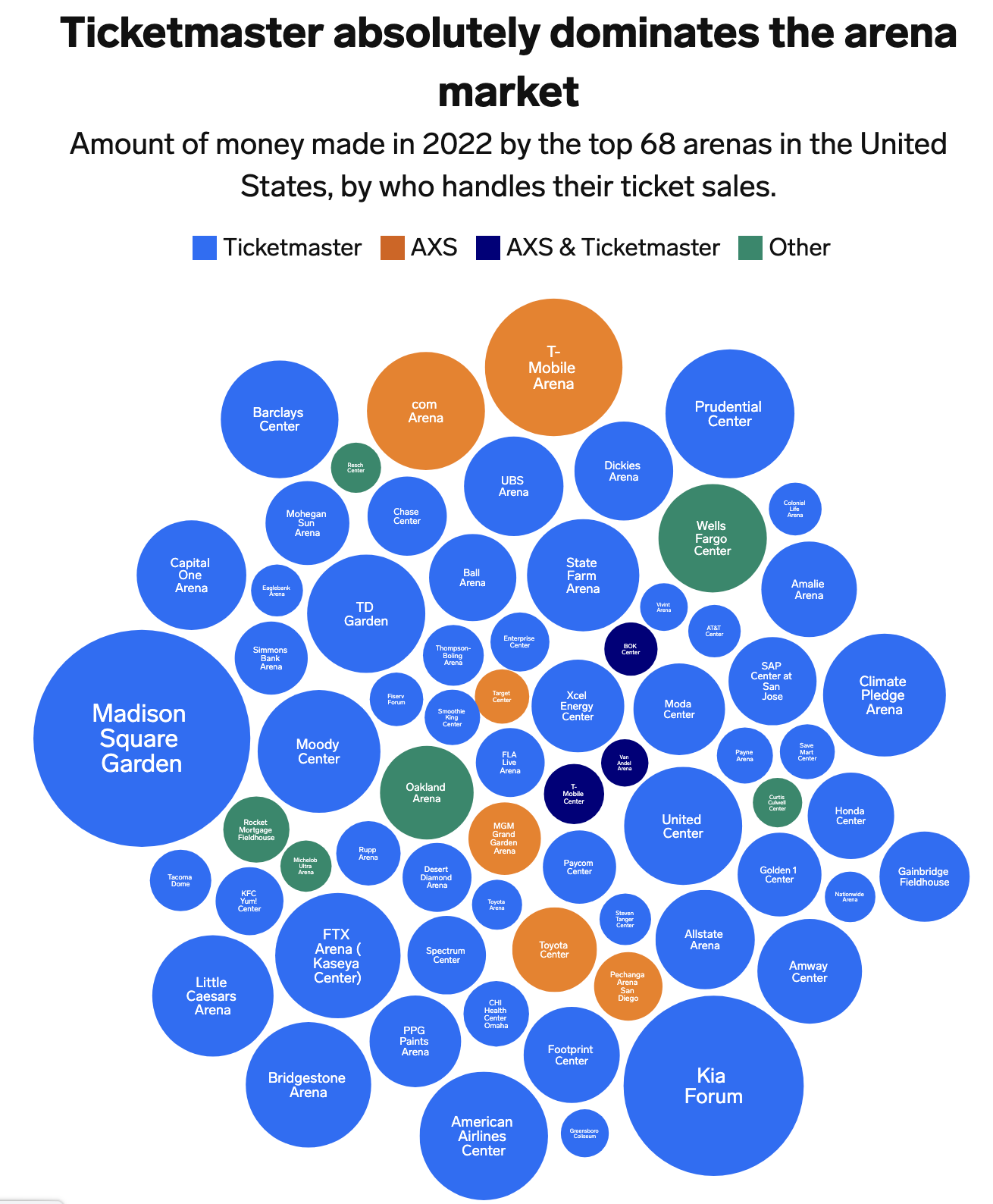
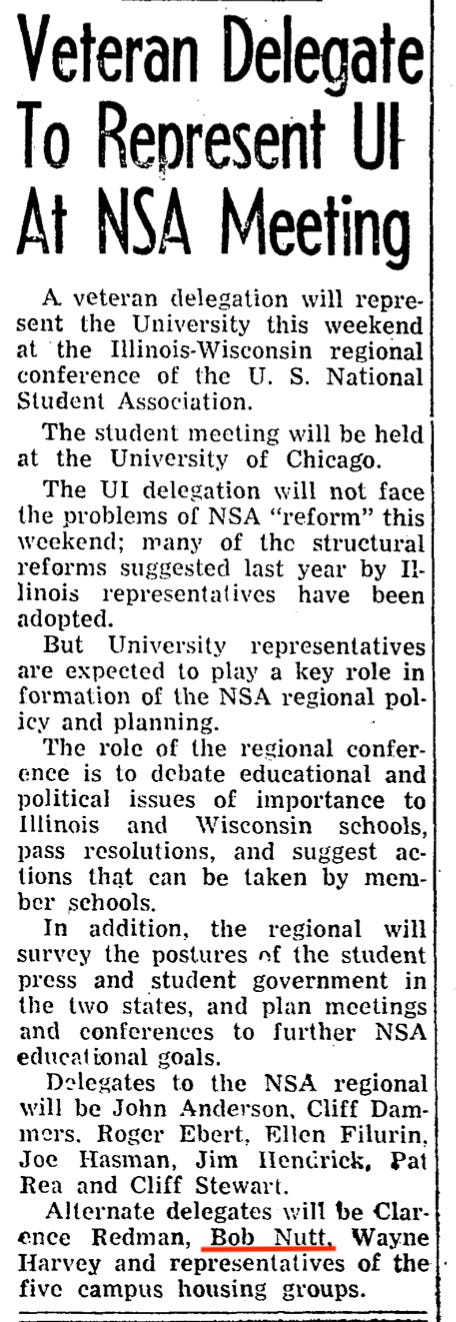
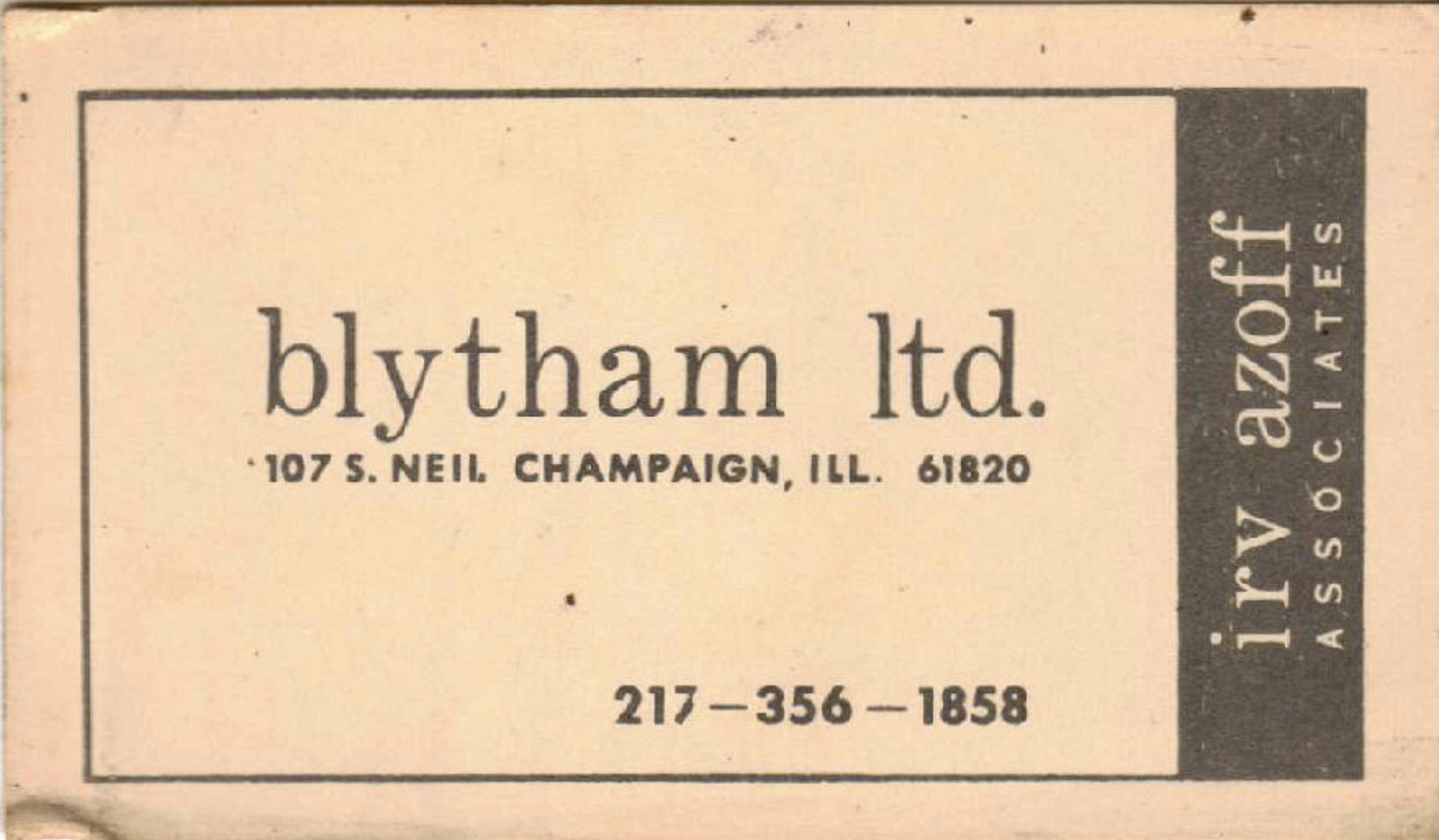
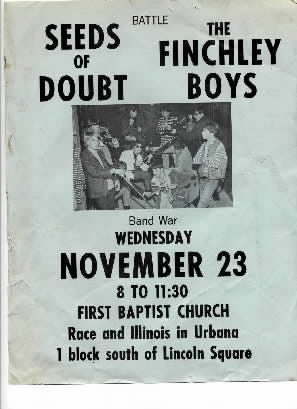
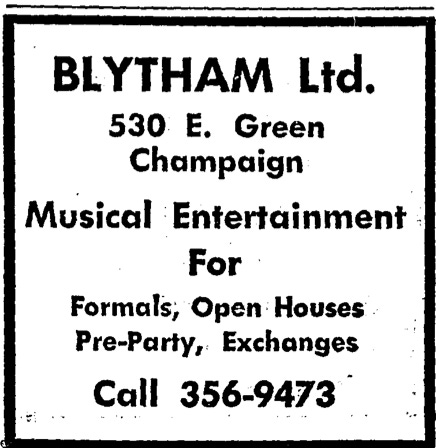
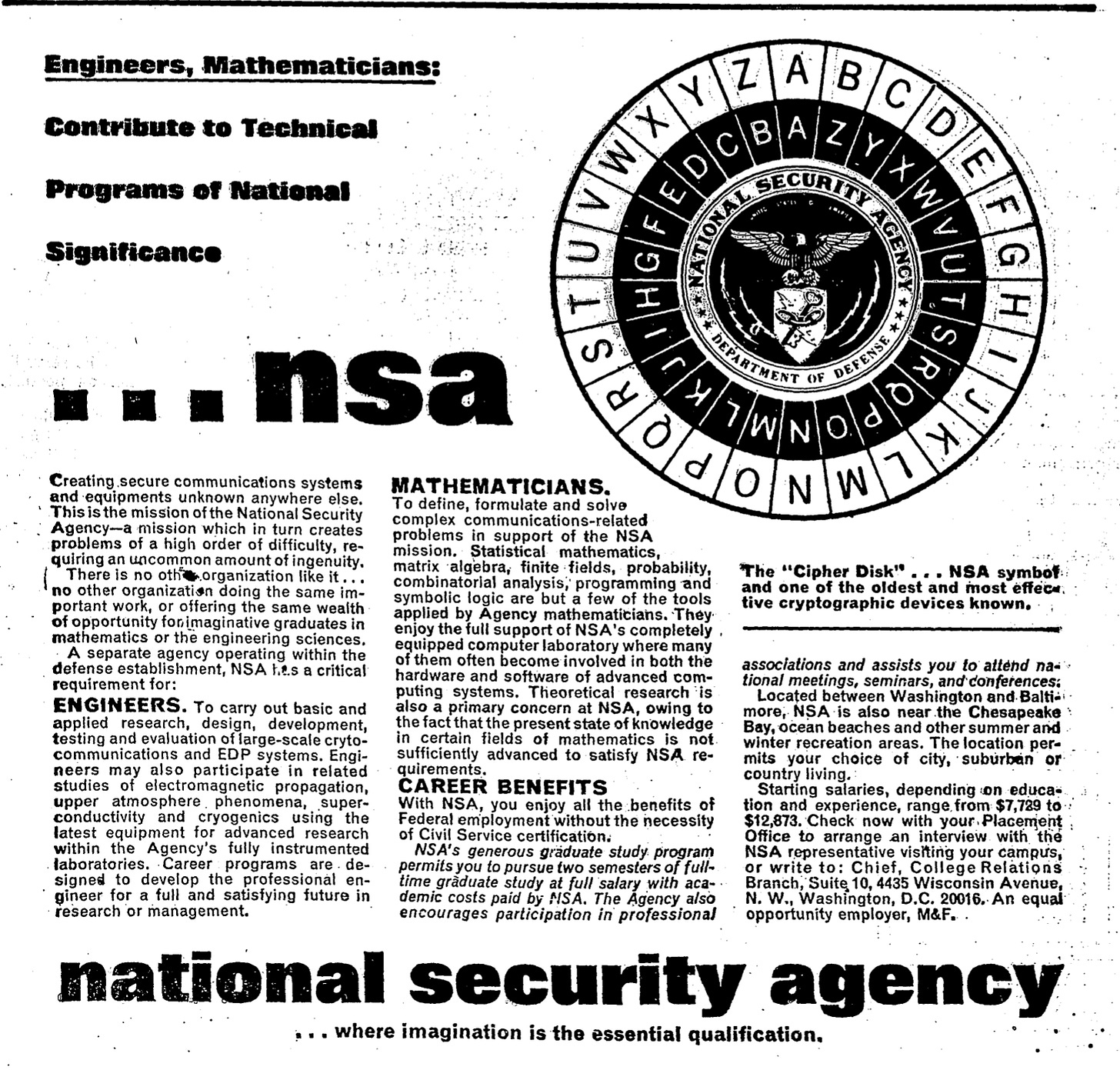
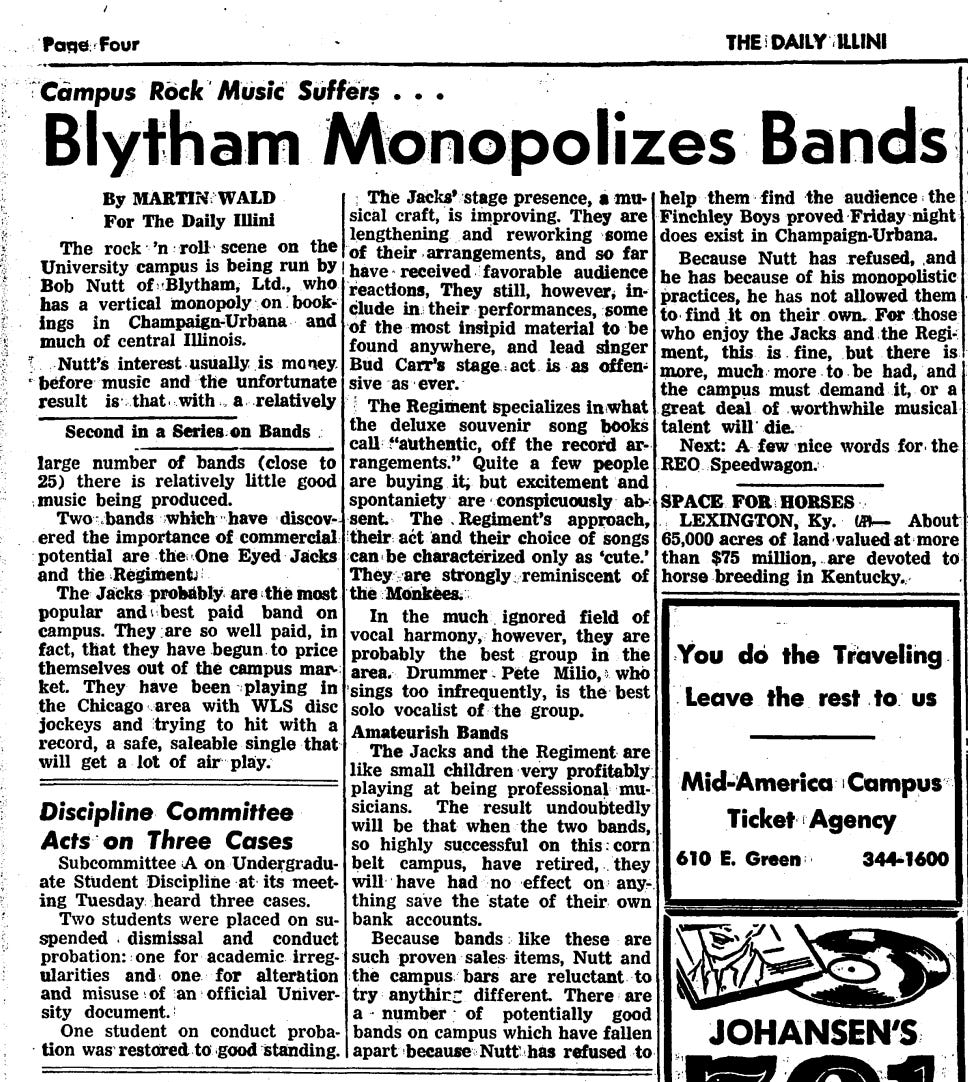
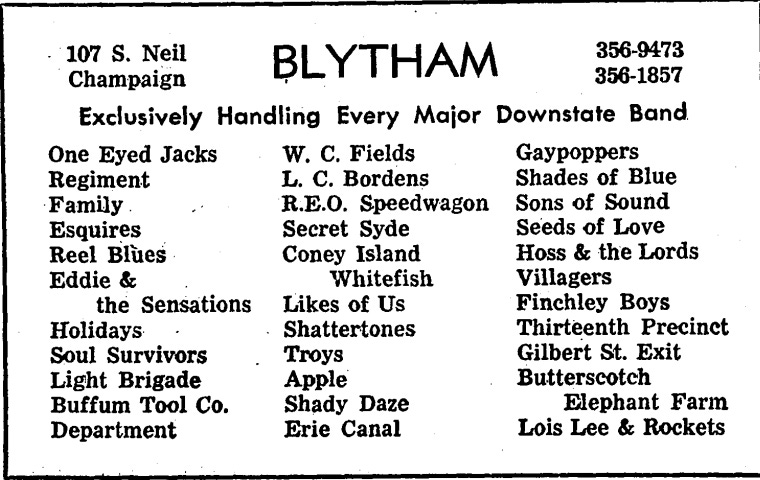
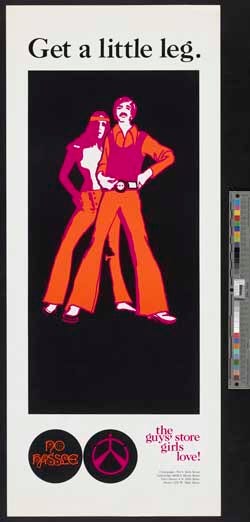
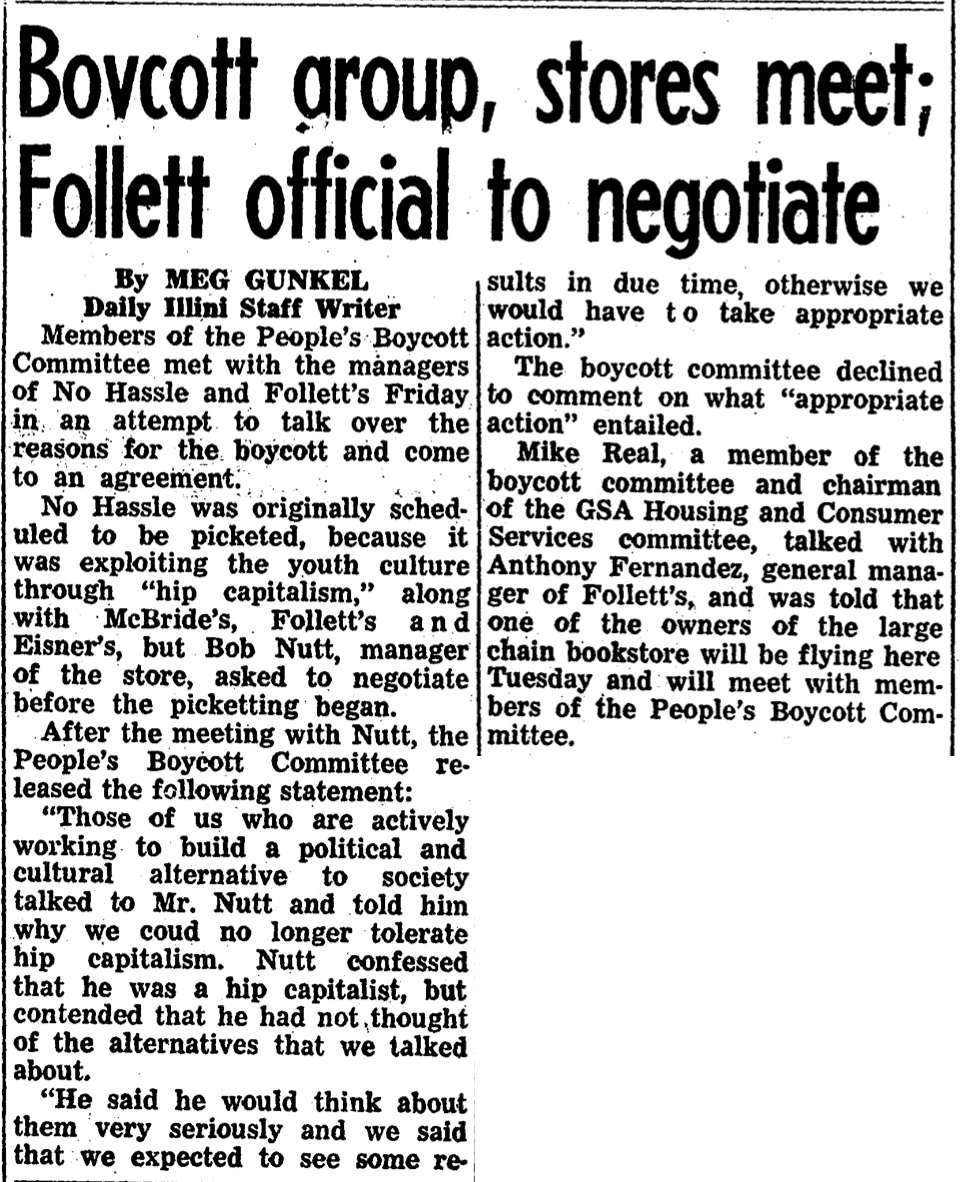
This is great work Melanie . Xx c